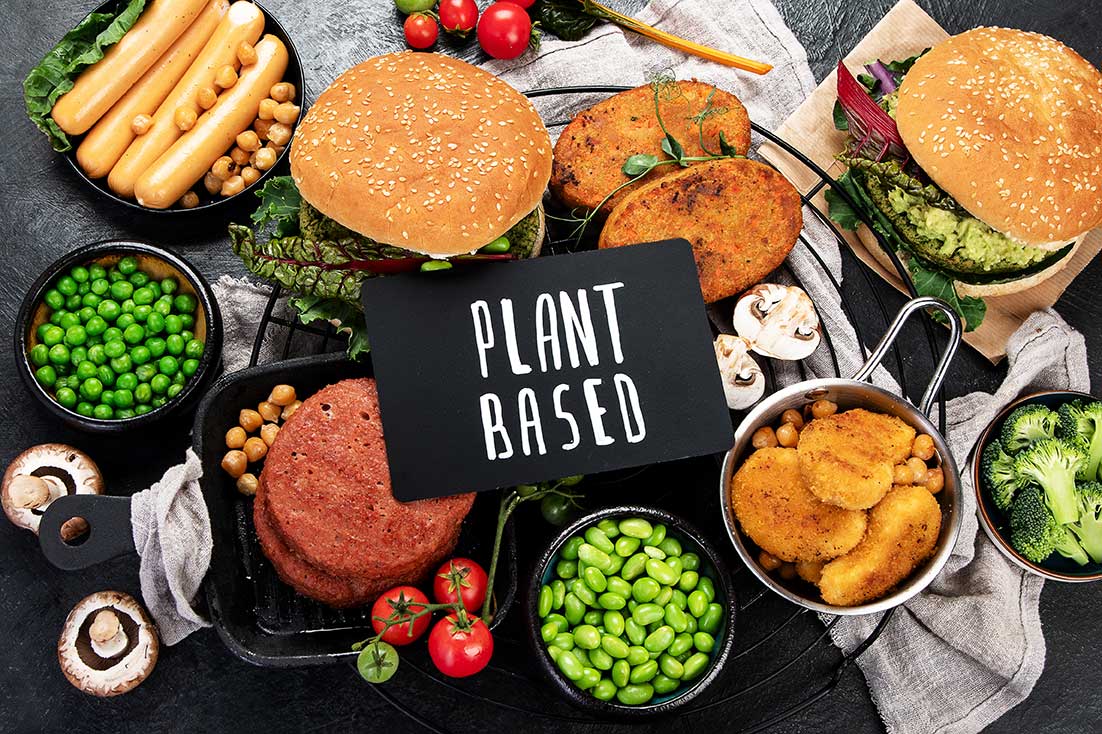All About Healthy And Balanced Food: Benefits of Enjoying Plant Based Choices
The conversation surrounding plant-based diet plans has actually gained substantial interest in the last few years. Numerous people are discovering the prospective health advantages, nutritional advantages, and environmental effects connected with these dietary choices. As people end up being a lot more aware of their food's impact on wellness and sustainability, concerns develop concerning the usefulness of taking on such a lifestyle. What certain modifications can one expect, and just how might these options reshape not just individual health and wellness but additionally the earth's future?
Recognizing Plant-Based Diet Regimens
Lots of people associate plant-based diet plans mostly with vegetarianism or veganism, these diet plans can include a large variety of eating patterns that focus on entire, minimally processed plant foods. Such diets commonly include fruits, veggies, entire grains, beans, seeds, and nuts, while limiting or getting rid of pet products. This adaptability allows people to customize their nutritional choices according to nutritional needs and individual preferences. Some may take on a mostly plant-based diet regimen while still periodically consuming meat or dairy, typically described as a flexitarian approach. The emphasis remains on incorporating even more plant foods, which can lead to a varied array of dishes and tastes. Understanding these different interpretations of plant-based eating is important for valuing its ease of access and charm in modern food society.
Health Conveniences of Plant-Based Foods
The wellness benefits of plant-based foods are significant, using a nutrient density advantage that supports general well-being. Research study suggests that these foods can boost heart health and play a necessary duty in efficient weight management. By integrating much more plant-based options, people might boost their nutritional options and advertise long-lasting health and wellness.
Nutrient Density Benefit
Nutrient density plays a necessary duty in the health benefits of plant-based foods, making them a compelling selection for those seeking a balanced diet plan. Plant-based foods, such as fruits, vegetables, vegetables, nuts, and entire grains, are typically abundant in crucial vitamins, minerals, and antioxidants while being reduced in calories. This high nutrient thickness enables individuals to take in less calories while still fulfilling their nutritional demands. In addition, these foods are loaded with nutritional fiber, promoting digestive health and helping in weight administration. By incorporating nutrient-dense plant-based options, consumers can enhance their overall health, support their body immune systems, and decrease the danger of chronic illness. Inevitably, the nutrient density of plant-based foods highlights their value in a health-conscious way of living.
Heart Health Improvement

Weight Administration Assistance
In addition to advertising heart health and wellness, a plant-based diet plan can considerably help in weight monitoring. This dietary strategy highlights whole foods such as fruits, vegetables, vegetables, nuts, and whole grains, which are generally lower in calories and higher in fiber compared to animal-based items. The high fiber material helps enhance satiation, lowering general calorie consumption. Plant-based diet regimens are frequently rich in necessary nutrients while low in harmful fats, making it less complicated to preserve a healthy weight. Research indicates that individuals that adopt a plant-based lifestyle have a tendency to have lower body mass indexes (BMIs) and experience more effective weight loss contrasted to those who eat meat-heavy diet regimens. As a result, welcoming plant-based options is a strategic option for efficient weight monitoring
Nutritional Value of Plant-Based Active Ingredients
Plant-based components are rich in important nutrients, providing a diverse variety of vitamins, minerals, and antioxidants that add to general health and wellness. A contrast of protein resources reveals that while animal products are often seen as remarkable, many plant-based options supply sufficient healthy protein and various other advantageous substances. Comprehending the dietary worth of these ingredients can assist people make notified dietary selections.
Vital Nutrients in Plants
Nutrient-rich active ingredients discovered in plants supply a varied range of necessary minerals and vitamins that add considerably to overall health and wellness. These active ingredients are abundant in vitamins A, C, and K, which support immune feature, vision, and blood clot, respectively. On top of that, plants provide important minerals such as calcium, magnesium, and potassium, crucial for heart wellness, muscle mass function, and bone toughness. The existence of fiber in plant-based foods aids food digestion and promotes a healthy and balanced digestive tract microbiome. Antioxidants, located generously in veggies and fruits, help battle oxidative stress and lower inflammation. Lots of plant foods are low in calories yet high in nutrients, making them an exceptional choice for those looking for to keep a healthy weight while making certain perfect nutrient consumption.

Comparing Protein Sources
Healthy protein resources vary considerably in their nutritional accounts, with plant-based active ingredients using special advantages. Unlike animal healthy proteins, which usually have hydrogenated fats and cholesterol, plant proteins tend to be reduced in these undesirable components. Legumes, nuts, seeds, and entire grains are abundant in vital amino acids, fiber, vitamins, and minerals. Lentils supply high protein web content together with significant iron and folate, while quinoa is a full protein, supplying all 9 important amino acids. In addition, plant-based healthy proteins are more tips here frequently come with by antioxidants and phytochemicals that sustain general health. The change to plant-based healthy protein sources not just improves nutritional intake yet also straightens with sustainable nutritional practices, minimizing environmental effect and promoting long-lasting wellness benefits.
Ecological Influence of Plant-Based Eating
As recognition of climate modification expands, numerous people are exploring sustainable nutritional selections that can significantly decrease their environmental footprint. Plant-based consuming has emerged as a substantial factor to decreasing greenhouse gas exhausts, which are primarily connected with animals manufacturing. The cultivation of fruits, grains, vegetables, and vegetables commonly requires fewer resources, such as water and land, compared to animal farming. Furthermore, plant-based diet regimens can lead to decreased deforestation, as less land is needed for grazing livestock or growing animal feed. By shifting towards plant-based choices, customers can sustain biodiversity and advertise much healthier ecosystems. In general, accepting plant-based eating not only benefits personal health and wellness however likewise stands for a crucial action towards ecological sustainability and conservation initiatives.
Overcoming Common Misconceptions
While lots of people acknowledge the benefits of a plant-based diet plan, a number of mistaken beliefs commonly hinder them from totally accepting this way of life. A typical belief is that plant-based diets do not have enough healthy protein; nonetheless, various plant sources, such as legumes, nuts, and tofu, provide enough healthy protein. In addition, some presume that this diet plan is expensive, when actually, staples like beans, rice, and seasonal veggies can be rather budget friendly. An additional mistaken belief is that plant-based eating is overly limiting, whereas it really provides Discover More a varied variety of flavors and foods. Ultimately, numerous worry that a plant-based diet regimen may lead to deficiencies, yet with appropriate planning, people can acquire all necessary nutrients, consisting of minerals and vitamins, while delighting in a wide array of delicious dishes.
Tips for Transitioning to a Plant-Based Way of life
Making the shift to a plant-based way of living can be an enriching experience, though it often needs some assistance to navigate the first changes. Initially, individuals are motivated to begin gradually, integrating even more fruits, vegetables, vegetables, and entire grains into their dishes while reducing meat and dairy products intake. Dish preparation is important; preparing an once a week food selection can help relieve the modification and protect against last-minute undesirable options. Discovering new recipes and cooking methods can additionally preserve and improve the experience enjoyment concerning plant-based consuming. Additionally, joining support system or communities can offer inspiration and share useful pointers. Staying informed about nutrition guarantees balanced dishes, protecting against shortages while cultivating a healthy and balanced, gratifying plant-based lifestyle.

Delicious Plant-Based Meal Concepts
Discovering delicious plant-based dish concepts can inspire individuals to welcome a more healthy diet regimen. One popular choice Discover More Here is a passionate quinoa salad, featuring cherry tomatoes, cucumber, and a spicy lemon-tahini clothing. Another favorite is a mouthwatering lentil stew, loaded with carrots, celery, and fragrant herbs, best for a calming dinner. For breakfast, overnight oats made with almond milk, chia seeds, and covered with fresh berries give a nutritious start to the day. Furthermore, a lively veggie stir-fry with tofu and a variety of colorful veggies can be a quick yet satisfying meal. Lastly, luscious avocado salute on whole-grain bread, sprayed with spices and seeds, provides a basic yet savory treat. These meals showcase the range and richness of plant-based eating.

Often Asked Questions
Can a Plant-Based Diet Regimen Supply Enough Healthy Protein?
The concern of whether a plant-based diet can offer sufficient healthy protein is usual. Many sources, consisting of legumes, nuts, seeds, and entire grains, can satisfy healthy protein requires effectively, sustaining a healthy and well balanced diet plan for people.
Are Plant-Based Diets Suitable for Kid?
The suitability of plant-based diet regimens for children relies on careful preparation. Adequate nutrients need to be guaranteed, consisting of proteins, vitamins, and minerals. With appropriate advice, such diets can sustain healthy and balanced growth and growth in children.
Exactly how Do I Eat in restaurants on a Plant-Based Diet?
Dining out on a plant-based diet regimen involves seeking dining establishments with diverse menus, requesting alterations, and exploring vegan-friendly choices. Preparation ahead and communicating dietary choices can boost the eating experience while maintaining dietary selections.
What Prevail Allergens in Plant-Based Foods?
Typical irritants in plant-based foods consist of soy, gluten, nuts, and seeds - Sugar Free Sauces. People adhering to a plant-based diet ought to know these irritants and review tags carefully to avoid unfavorable responses and ensure secure intake
Can Plant-Based Diets Aid With Weight Reduction?
Research study suggests that embracing a plant-based diet plan might assist in fat burning because of its typically lower calorie thickness and higher fiber material. This combination can improve satiety, assisting individuals manage their caloric intake effectively. Many individuals link plant-based diet regimens mostly with vegetarianism or veganism, these diet regimens can encompass a vast array of consuming patterns that prioritize whole, minimally processed plant foods. Nutrient thickness plays an essential duty in the wellness advantages of plant-based foods, making them a compelling choice for those seeking a well balanced diet regimen. Plant-based diet plans have been shown to markedly boost heart wellness, as they commonly include elements that sustain cardio function. In enhancement to advertising heart health and wellness, a plant-based diet can substantially help in weight management. An usual idea is that plant-based diets do not have adequate protein; nonetheless, many plant sources, such as beans, nuts, and tofu, offer ample healthy protein.
Comments on “Tips for Hosting a BBQ Using Only Gluten Free BBQ Sauce and Vegan Ingredients”